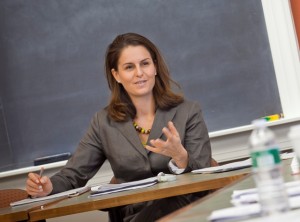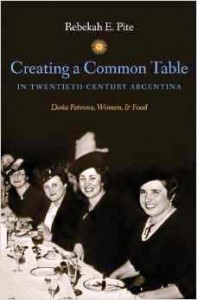Rebekah Pite, associate professor of history, has received a Fulbright Fellowship to study the history of yerba mate, the most popular caffeinated beverage in South American history.

Rebekah Pite, associate professor of history
Pite will spend about a year in Buenos Aires beginning this summer. She also will co-teach a graduate course on gendered histories of work and everyday life in the Americas with a colleague at the University of Buenos Aires’ Interdisciplinary Gender Institute.
Yerba mate is made from the leaves of a holly-like tree indigenous to a region encompassing parts of Argentina, Brazil, and Paraguay. In the U.S., it can be found in many grocery store health food aisles and cafés, often mistakenly labeled as a green tea.
“Many South Americans’ days are punctuated by the ritual drinking of yerba mate,” says Pite. “Friends and families from a wide variety of socioeconomic backgrounds gather in parks to socialize over rounds of mate, students sip it while studying, others consume it during a work break, on a bus, or at home. And yet, despite its research potential, we know relatively little about its recent history.”
Pite plans to conduct archival, ethnographic, and oral historical research in Argentina and Uruguay, the largest 20th century producer and per-capita consumer of yerba mate, respectively.
Geraldo Neto ’15, a student from Brazil who graduated this May with majors in international affairs and economics, worked with Pite through Lafaeytte’s EXCEL Scholars undergraduate research program to conduct research in Portuguese on the Brazilian history of yerba mate production and promotion. His work helped Pite prepare a talk that compared Brazilian and Argentine efforts to grow and market yerba mate, which she presented this spring at the Mid Atlantic Latin American Studies Association annual conference.
Pite points out that historians and scholars typically study Latin American countries individually or through comparative politics while often ignoring themes of regional continuity. Scholars also tend to emphasize commodity histories in which business interests and consumers from Europe and the United States have played starring roles. Pite will take a different approach.
“The history of yerba mate exposes the dynamics of a commodity chain in which neither the United States nor Europe were particularly interested or active,” she says. “This stands in contrast to the more familiar histories of other coveted, labor-intensive foods like sugar, coffee, and tea, where scholars have traced their consumption in Europe and the U.S. but generally overlooked consumption in post-colonial zones of production like Latin America. As such, exploring this history will shed new light on Latin Americans’ roles not only as producers but also as consumers of a coveted local product.”
More accolades for award-winning book

Creating a Common Table by Rebekah Pite
Pite is the author of Creating a Common Table in Twentieth-Century Argentina: Doña Petrona, Women, & Food (University of North Carolina Press, 2013). The book was honored with the 2014 Southern Cone Studies Section Social Sciences Book Prize for best book by a member of this section, which includes scholars who study the region that encompasses Argentina, Chile, Uruguay, and bordering nations, and is a subsection of the Latin American Studies Association. She accepted the award at the association’s annual meeting in Chicago.
Creating a Common Table previously won the 2013 Gourmand World Cookbook Award for best Latin American Cuisine Book published in the United States.
The book focuses on Doña Petrona C. de Gandulfo (1896-1992), Argentina’s most influential domestic expert and a national female figure. But it is much more than a biography. It is also a history of 20th century Argentina that, according to the book jacket, “illuminates the important role of food—its consumption, preparation, and production—in daily life, class formation, and national identity.”


1 Comment
Ms. Pite, I am a ’61 Gov’t and Law Grad from Lafayette. In 2009, at age 69, I was a grad student in political science at University of South Florida in Tampa to earn enough additional graduate credits in political science to teach at Hillsborough Community College where I am an Adjunct Poli Sci professor.
While at USF I wrote a paper entitled “The Whitening of Argentina”. If you are interested in my emailing you a copy – but remember it will not be as scholarly as you are used to – I would be pleased to so do.
Good luck on your sojurn!
Tom Grimm
Comments are closed.